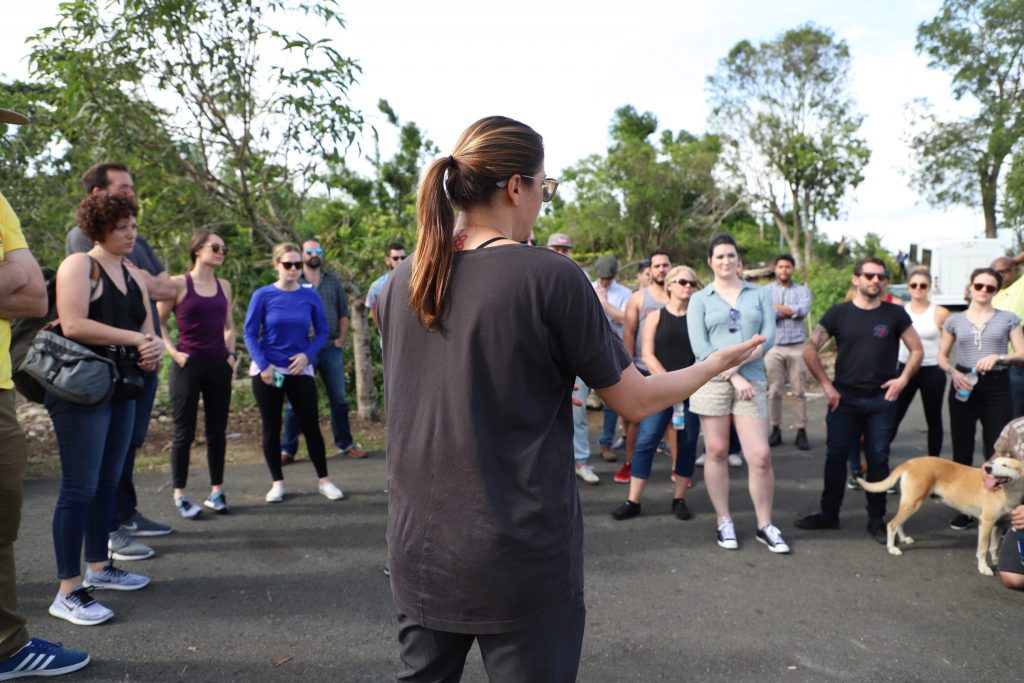Skift Take
As Puerto Rico's tourism industry recovers, big business from global companies may sound great, but so does slow-and-steady growth based in local communities. Puerto Rican women are doing that community-focused work.
Melina Aguilar Colón stood before a group of 16 visitors at a local café in Ponce, Puerto Rico. It was a sunny, breezy day and a nice long walking tour of the city along the island’s southern coast would soon begin. Only problem was the earthquakes had just hit: Museums were closed, some streets were cut off, and some structures were damaged and had to be appreciated from a distance. She went forth leading the tour anyway.
“I am worried that some museums might not open for months or years,” said Aguilar Colón by email. Her tours are available on Local Guest, a women-run tours and experiences company based in San Juan that launched in 2017. “Overall Ponce is open for business and we need people to come and visit and support the economy. If not, cities and towns in the southern part of the island will become ghost towns because of the earthquakes, hurricanes, and bad governance.”
She is one of many women in Puerto Rico working at the community level to keep the tourism industry healthy in the face of challenge after challenge.
“This industry has grown, opening its arms to women with women taking more leadership roles,” said Mónica Pérez, a co-founder of Local Guest.
The company’s main goal is to develop sustainable tourism practices that allow the local economy to retain at least 80 percent of the money spent on a trip. G Adventures measures this leakage of tourism dollars away from a community through something it calls a “ripple score,” though it does not currently offer any trips to Puerto Rico.
Of the experiences on the Local Guest platform, 61 percent are led by women or have female co-founders, according to Pérez and Local Guest co-founder Carmen Portela. They noted that much of Caribbean tourism involves large companies that are male-dominated at the C level, for example global cruise and hotel brands that sell to mass audiences.
Sustainable growth is especially important as Puerto Rico’s tourism recovers from an array of difficulties, the most recent of which was a series of earthquakes.
“There are places on the island that are fully unaffected, except if people don’t visit, then they become affected. A natural disaster becomes an economic disaster,” said Rachel Bouton, domestic and co-branded trip program manager for tour operator Atlas Obscura. Bouton recently partnered with Local Guest on a new Atlas Obscura trip to Puerto Rico, to debut in April. Promoting responsible tourism growth was a key factor for Bouton in this project.
“We did see this [Puerto Rico trip] appealing to an audience that has educated themselves about issues of sustainability, both from an environmental perspective and also from an economic perspective,” said Bouton. Atlas Obscura has not yet offered a women-only trip, but Bouton said the Puerto Rico trip could be a future candidate for targeting female travelers. She added that Atlas Obscura is focused on closing the gender gap among tour guides and trip leaders, and that their science and wildlife guides are majority women, which is not the norm in those fields.
In Puerto Rico there has been a big focus on getting women to become tour guides or hotel workers, according to Portela and Pérez, but they find it’s important to publicize lesser-known avenues like becoming an interpreter or running transportation services.
Puerto Rico’s tourism industry has been running a marathon of positive messaging in recent years to keep visitation flowing. Back in 2016 Puerto Rico was trying to quell traveler fears about the zika virus amid a mounting financial crisis. Then Hurricane María devastated the island in 2017, after which it struggled to recover without sufficient support from the Trump administration. Then in 2019, protests erupted over offensive comments from then-Governor Ricardo Rosselló, which led to his resignation.
In January, after the recent earthquakes, the World Travel & Tourism Council pulled its Global Summit from Puerto Rico, moving it to Cancún, Mexico. According to a WTTC press release, it will hold a “major event” in San Juan later in 2020. WTTC framed the decision as one that would help Puerto Rico’s tourism industry. “Although the island was ready to welcome us with open arms this April, despite the recent seismic activity in the southern region, reallocating resources to continue this great momentum is the right thing to do in order to further boost tourism,” said WTTC President and CEO Gloria Guevara in the release.
To try and move forward into the future, Pérez and Portela see opportunity in diaspora tourism, in which people of Puerto Rican descent living off the island book trips to explore their ancestry. This kind of personal, meaningful experience is increasingly important in the black travel movement and could pick up steam in Latin America as well.
Disclosure: Skift founder and CEO Rafat Ali serves on the 25-member advisory board to Destination Puerto Rico, as part of Skift Foundation‘s commitment to helping Puerto Rico in its tourism recovery.
The Daily Newsletter
Our daily coverage of the global travel industry. Written by editors and analysts from across Skift’s brands.
Have a confidential tip for Skift? Get in touch
Tags: climate change, puerto rico, sustainability, women
Photo credit: Local Guest co-founder Carmen Portela speaks before going caving in Las Cabachuelas, Morovis. Local Guest is focused on sustainable tourism in Puerto Rico. Local Guest

